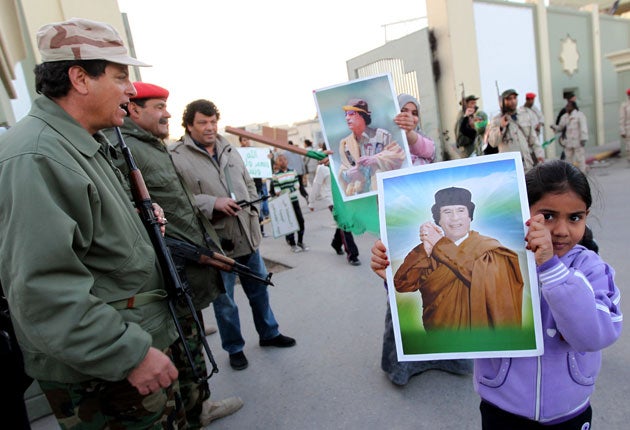Loyalists shout for their leader – but Gaddafi is nowhere to be seen

Your support helps us to tell the story
From reproductive rights to climate change to Big Tech, The Independent is on the ground when the story is developing. Whether it's investigating the financials of Elon Musk's pro-Trump PAC or producing our latest documentary, 'The A Word', which shines a light on the American women fighting for reproductive rights, we know how important it is to parse out the facts from the messaging.
At such a critical moment in US history, we need reporters on the ground. Your donation allows us to keep sending journalists to speak to both sides of the story.
The Independent is trusted by Americans across the entire political spectrum. And unlike many other quality news outlets, we choose not to lock Americans out of our reporting and analysis with paywalls. We believe quality journalism should be available to everyone, paid for by those who can afford it.
Your support makes all the difference."Zenga zenga" they sang, ecstatically, swaying to the faintly African rhythm, "alleyway by alleyway". The lyrics were chilling, lifted from the 22 February speech of Muammar Gaddafi, promising to hunt down his enemies, inch by inch, street by street, house by house.
The setting in the Gaddafi Bab Al Azizia compound – where they had flocked to proclaim their loyalty to the regime – might be a little macabre; behind them a pleasant park, dotted with palm and olive trees, the lights of the Carinthia and the (empty) Marriott hotels twinkling in the distance, but in front of them the carefully preserved "House of Resistance" – the wreckage of the two-storey building, (second-floor windows blown out, large shrapnel dents in the wall) attacked by Ronald Reagan's jets in April 1986. That attack was in response to the bombing of a Berlin discotheque frequented by US servicemen that left three people dead.
But there was a carnival atmosphere to all this adoration of the brother leader; four singing, dancing, hand-pumping youths were perched perilously atop the regime's latest piece of agitprop sculpture, a giant golden fist crushing a foreign fighter jet. It was hard, looking at this crowd, not to believe that a strain of genuine fanaticism ran through it, or not to reflect that everyone here under 42 – and that was almost all of them – had never lived under any other ruler than Gaddafi.
As a large scale mass human shield, however, the event was less compelling. At the peak, in the late afternoon sunshine, there had been perhaps 2,000 men, women and children who had streamed past armed soldiers, a tank and militiamen in civilian clothes armed with AK-47s to proclaim their loyalty. Amid shouts of "Sarkozy no" and "Allah, Muammar, Libya – that's it," one young woman, Fatima al Mishai, 20, said: "We have not been in afraid in Tripoli, but yes we are afraid of bombing. That's why we are here to protect Muammar Gaddafi."
Misar Azaruk, a doctor, said: "I don't know why they make war on Libya. Look at all the children who have come to Bab al Azizia to celebrate."
The banners proclaimed: "Libya is united and out of your reach", "We are waiting for you and so are the fishes" and "We will die for the stability of Libya". A red-hatted puppet caricature of Mustafa Abdel Jalil, the justice minister who defected to the rebels in distant Benghazi, bobbed up and down to the music.
Ghazal Muftah, a beaming 52-year-old grandmother and soldier's widow, who said she had been at the compound for three days, declared unhesitatingly: "If they want to hit Muammar Gaddafi they have to hit us. We are all Muammar Gaddafi."
But by Saturday evening the still highly enthusiastic crowd was down to a few hundred. In retrospect, it seemed obvious that the man they had come to honour – and ostensibly protect – would not actually address his devoted band of supporters here, as the Mirages, Tornados and F16s had begun to enter Libyan air space.
Why should he give his position away to the "crusader enemy"? But at the time it was part of what kept them going. When the mobile phones began to ring with the news of the strikes – including in the vicinity of Tripoli – the mood started to change. The crowd began to thin and those sitting on the grass began to pack their belongings.
Gaddafi would speak – but to Libyan state television, from an unknown location; by midnight only a few dozen dedicated people at most – mainly young men – were maintaining the vigil in the compound.
Join our commenting forum
Join thought-provoking conversations, follow other Independent readers and see their replies
Comments